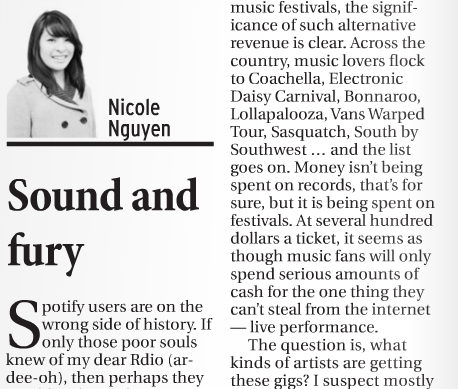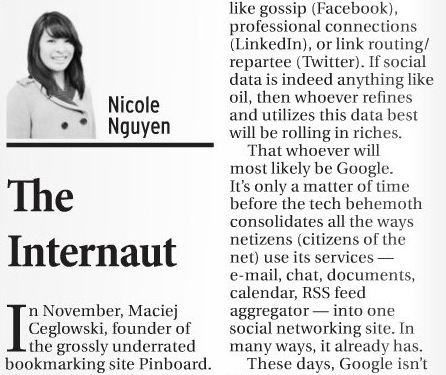Appeared in the California Aggie on May 14, 2012
Spotify users are on the wrong side of history. If only those poor souls knew of my dear Rdio (ar-dee-oh), then perhaps they would realize. Rdio can’t seem to pick up subscribers in the way its music subscription rival Spotify can, despite the fact that Rdio’s beauty and craftsmanship are far superior.
This column was initially intended as a rallying cry/desperate plea convincing music lovers to come to Rdio. But after I came to understand how subscription sites work, I realized that it wasn’t just the Spotified who may be on the wrong side of history. It may be us all.
It is we, the subscribers — both paying and un-paying — of sites like Spotify, Rdio, Grooveshark, etc., who may be most guilty of contributing to a vicious cycle that rewards mainstream artists at big labels to the detriment of up-and-coming musicians at smaller labels. But it all depends on which definition of success we’re looking at.
If survival in the industry means record sales then, yes, music streaming services does not look sustainable. Artists earn about 9 cents from a 99 cent iTunes download. This may not seem like much, but compared to the fraction of a penny they earn from streaming royalties, it’s a world of difference. On Spotify, that rate is .004 cents per stream. In other words, an artist only earns $4,000 after their song has been listened to one million times. That’s nothing. No wonder why the streaming model infuriates the music industry.
Pirated music, however, merits a musician even less. Music subscription services at least provide some income, however minimal. Per-unit sales are not as important, they claim, as listening exposure. Because more exposure builds a fan base who buys merchandise and tickets to shows, the proceeds of which go right into the artist’s pockets.
In this age of big-budget worldwide tours and music festivals, the significance of such alternative revenue is clear. Across the country, music lovers flock to Coachella, Electronic Daisy Carnival, Bonnaroo, Lollapalooza, Vans Warped Tour, Sasquatch, South by Southwest … and the list goes on. Money isn’t being spent on records, that’s for sure, but it is being spent on festivals. At several hundred dollars a ticket, it seems as though music fans will only spend serious amounts of cash for the one thing they can’t steal from the internet — live performance.
The question is, what kinds of artists are getting these gigs? I suspect mostly established artists with lots of representation — artists from major labels.
Artists from smaller labels rely on the power of music discovery to establish themselves, which is not at all about selling records. In the post-Napster era, independent artists have made it big by offering their music online, for free. MySpace may not work in the social space anymore, but its music network is responsible for the thriving careers of many bands (like the Arctic Monkeys). Self-reliant musicians can indeed make it by way of the web.
Online streaming services allow subscribers to access huge libraries of music — millions and millions of songs — for about the cost of one album per month. These services put listeners in touch with music at the fringes of their libraries by offering suggestions of related artists, or curating playlists for specific audiences. Subscription sites can increase exposure and music consumption overall — and that, I think, is a good thing for the music industry in general.
Sites like Rdio and Spotify are the best economic choice for people who listen to a lot of music, which is why it will define the role of the internet in the ever changing domain of digital music. Music subscription sites offer a happy medium between the instant gratification of music available online without the iTunes pricetag, and the unlimited access of torrents without the criminality. It is a gain for both consumer and industry.
If music executives embrace this technology, the industry, in the words of “Game of Thrones’” Tyrion Lannister, “may survive us yet.”
NICOLE NGUYEN also thinks anti-gay marriage proponents are on the wrong side of history. Reasons why at niknguyen@ucdavis.edu.

